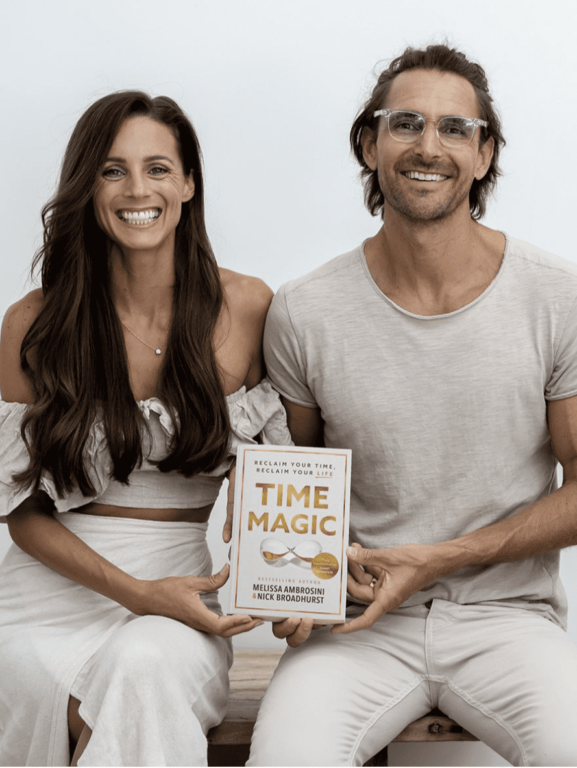It’s the one thing we never have enough of: that ancient and non-renewable resource, time. Behold, though, two new time magicians on the scene to help you turn that slippery stream of time down the drain into something more viscous and meaningful. Meet Melissa Ambrosini and Nick Broadhurst, authors of Time Magic, a resource that not only shares methods on amplifying creativity and honing your productivity, but also incorporates wellness tips on making the life you’ve got… the best one possible. Melissa took the time (pun intended) to share with us her inspiration in penning the project with her husband, tips for getting started, and some of her favorite time management hacks.
Wanderlust: Your book is chock full of totally accessible, and easy-to-enact methods that take the friction out of so many daily tasks. But as you well know, humans almost always opt to keep doing things the way they’ve been doing them, despite knowing that a habit shift might reap rewards. What do you say to folks who have the reluctance for that first output of effort to make change, whether that’s downloading a new task management app, or adopting a new mindset? How would you encourage them to get over that first hump, and into a new lane?
Melissa Ambrosini: If you’re feeling reluctant to make a change, it’s important to acknowledge your feelings and not beat yourself up. Change can be challenging and uncomfortable, so it’s perfectly natural to feel some resistance to it at first. At the same time, change can also lead to personal growth and evolution. It’s the bridge from where you are now to where you want to be, so it’s worth persisting!
 Getting your mindset right can be a very helpful first step (which is why we spend a whole chapter on it in the book). In particular, adopting a growth mindset is critical. This means having an integrated understanding that your skills in this area are not fixed, they can improve. Research shows that having this mindset can radically increase your odds of successfully creating change.
Getting your mindset right can be a very helpful first step (which is why we spend a whole chapter on it in the book). In particular, adopting a growth mindset is critical. This means having an integrated understanding that your skills in this area are not fixed, they can improve. Research shows that having this mindset can radically increase your odds of successfully creating change.
Another helpful tip is to start with a habit or skill that appeals to you or that plays to your natural strengths, and to break it down into manageable chunks. So start small, and when you start to stack up some wins, you can slowly add in more and more shifts.
WL: You and Nick have a varied and deep background exploring wellness and guiding your community to optimizing their lives. What was the moment when you realized that crystallizing your learnings into a book focused on time management would be the most potent way to distill your magic?
MA: If you’d told either of us a few years ago that we’d one day write a book about time and how to spend it, we probably would have had a good giggle. After all, we weren’t good with time! And we never had enough of it—Nick was a single dad headed towards burnout with zero time for his son, while I was an overwhelmed people-pleaser whose time was always eaten up by other people’s priorities.
When our relationship began more than a decade ago, so too began our journey of changing our relationship with time—not just so that we could “get more done”, but also so that we could create a spacious life that allowed plenty of time for the activities and people we love.
Eventually, we got so good at optimizing our time that the people around us (friends, family, followers) began asking us “How the heck do you do it?!”
We didn’t realize we were doing anything special, but they could see that we were getting superhuman amounts of work done while still having a joy-filled, meaningful life.
So after getting asked that same question again and again, we finally realized we needed to capture all the tools and techniques that had become second nature to us in one place, so that others could benefit from them too. So that’s when the idea for Time Magic really took hold.
WL: Focus (and honing skills related to focus) are a recurring theme in the book. It feels particularly important for this digital generation, growing up in a world of technology and notifications, to practice discernment and learn how to bring their attention to one thing. What advice do you have for parents, teachers, and caregivers around the best method(s) to help littles flex the muscle of focus?
 MA: Our daughter is two. One of the ways we build the skill of focus with her is to not interrupt her self-directed play. If you start paying attention to this, it’s actually quite funny how often we, as adults, feel the need to insert ourselves into our children’s solo play. It’s usually done with the best of intentions, but one unfortunate side effect is that it can break their flow and stifle them from building the all-important skill of focus. So of course, we do plenty of play with our daughter, but if she’s doing something on her own, we do our best to not splinter her concentration and let her explore the world in an uninterrupted way.
MA: Our daughter is two. One of the ways we build the skill of focus with her is to not interrupt her self-directed play. If you start paying attention to this, it’s actually quite funny how often we, as adults, feel the need to insert ourselves into our children’s solo play. It’s usually done with the best of intentions, but one unfortunate side effect is that it can break their flow and stifle them from building the all-important skill of focus. So of course, we do plenty of play with our daughter, but if she’s doing something on her own, we do our best to not splinter her concentration and let her explore the world in an uninterrupted way.
WL: What’s the one single time-saving hack that’s made the biggest difference in your life?
MA: The one, single time-saving hack that’s made the biggest difference in my life is the deep understanding that how we spend our days is how we spend our lives. It was a huge turning point for me when I truly understood that life isn’t just about the big moments and the ‘important’ days; life is now, in the random minutes and hours we are gifted every day. It is incredibly empowering when you finally get, on a heart and soul level, that by being intentional with how you spend small units of time (your minutes, hours and days), you can change how the whole of your life plays out, and ensure that you’re creating a life that’s aligned with your highest values and vision.
On a more specific level, the productivity system we developed—Tick or Flick™—has freed up so much mental bandwidth, taken so much stress off my plate, and ensured that I get the right things done each day. It’s an epically powerful system that’s elegant in its simplicity. If your brain feels overwhelmed, or if you find yourself forgetting tasks or missing deadlines, I highly recommend giving it a shot!
WL: You and Nick worked together to write this book, so clearly you align on the best ways to make the most of your time together as partners. How important is it for someone’s principal partners (spouse, business partner, co-parents, roommates, etc) to get on the same page with these methodologies?
MA: It obviously makes life easier when you’re on the same page as your spouse, colleagues or boss about your approach to things like time management, planning and organization. But if they have different views from you, don’t let that stop you from taking action. There are so many habits and techniques you can implement by yourself to enhance and optimize your time, so take action and lead by example. (When they see how much you’re getting done, and with so little stress and fuss, you might just convert them!)
That said, people are allowed to have different approaches and there is no one size fits all. When you encounter a situation where differing approaches are resulting in tension, harness the power of what I call ‘CCC’ — Crystal Clear Communication. Communicate openly, transparently and without ego to ensure that everyone is clear on their responsibilities and timeframes, even if they’re using different methods to reach the finish line.
—
 Karina Mackenzie is writer, producer, and wearer of many hats at Wanderlust. As Sr. Director of Programming & Content she books talent and designs experiences for Wanderlust events, curates the Wanderlust TV platform, and also contributes editorial pieces as a writer, creates content for social and video projects. After over a decade of working in the yogic realm, she still can’t do a handstand away from the wall.
Karina Mackenzie is writer, producer, and wearer of many hats at Wanderlust. As Sr. Director of Programming & Content she books talent and designs experiences for Wanderlust events, curates the Wanderlust TV platform, and also contributes editorial pieces as a writer, creates content for social and video projects. After over a decade of working in the yogic realm, she still can’t do a handstand away from the wall.
She served for 5+ years on the board of non-profit, Yoga Foster (now Wellemental), whose mission is to make mindfulness elementary in public schools across America, and co-chaired the Green Wellness committee in Brooklyn public school when her kids were wee.
She now lives in the woods of New England with her two favorite small humans and husband, learning (clumsily) how to lean into country life.

